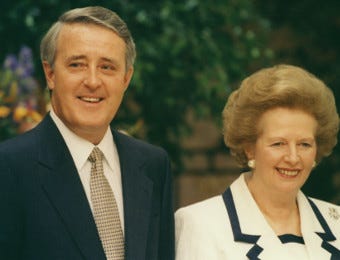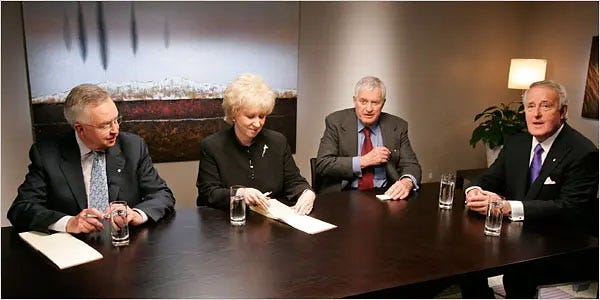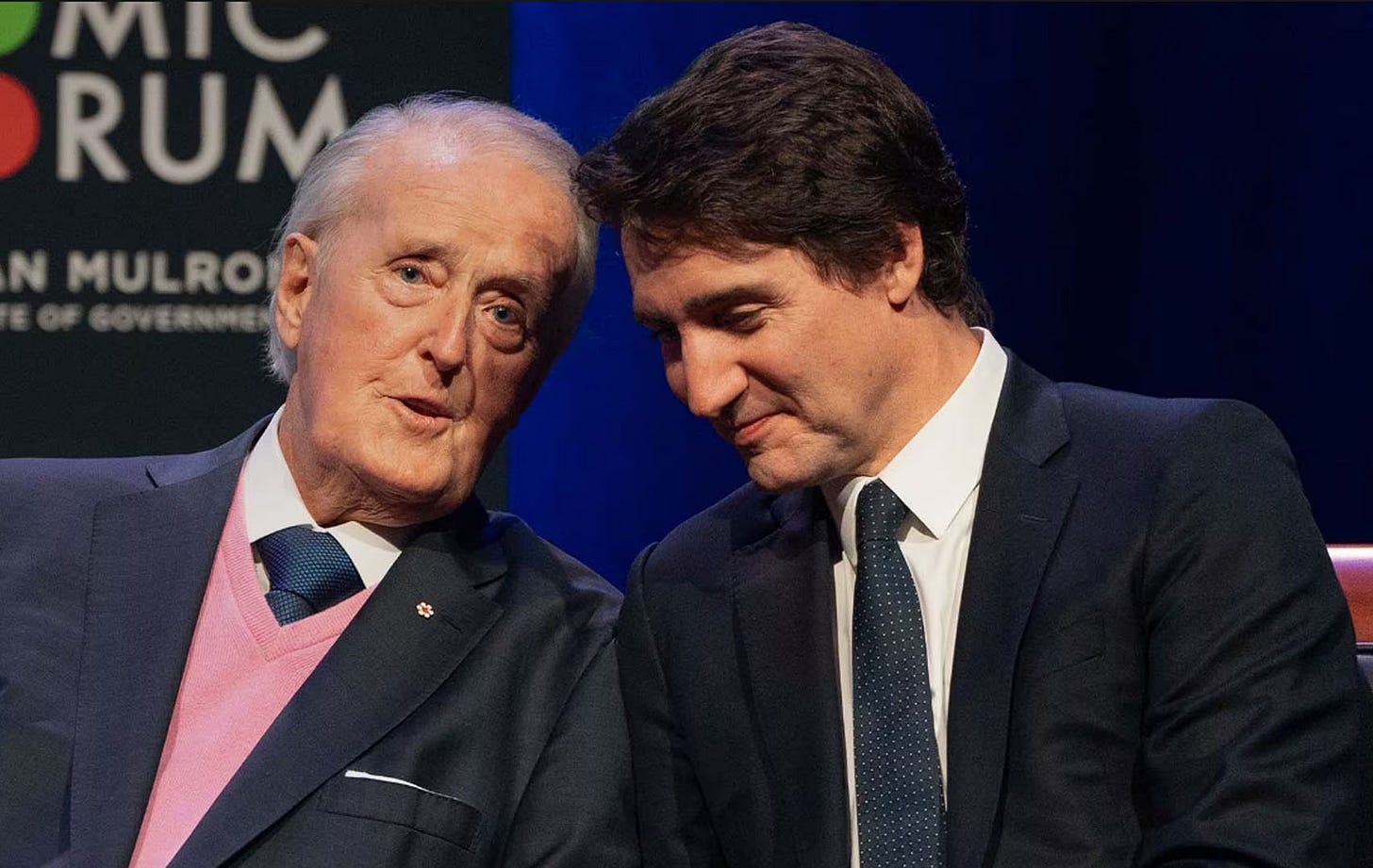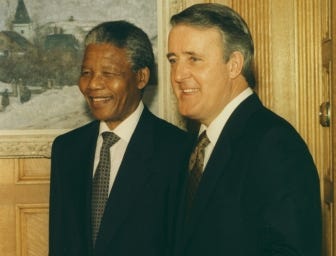The 18th prime minister of Canada, Brian Mulroney, passed away yesterday, February 29, weeks short of his 85th birthday.
Consequential? "One of the most consequential Prime Ministers" is the expression you may have seen about Brian Mulroney half a dozen times since yesterday. It is a formula empty of substance to describe a leader of such significant import to the country. It seems the Canadian media have been trawling through their thesauri for a phrase that neutrally appraises and subtly criticises the former leader. It's a phrase that emerged in The HUB and Bloomberg, as well as the radical left-wing platform we know as CBC.
Consider that if they're dubbing a prime minister as being 'consequential', they are implying that some prime ministers were 'inconsequential.' One might categorise John Turner as somewhat inconsequential as PM. Kim Campbell too could be considered as such unless one remembers her erasing of the Canadian Airborne unit. Notably, Conservatives highlight Campbell as the pioneer female Prime Minister, standing in stark contrast to the Liberal Party, who are yet to place a woman at their helm three decades later. That reminds me that Prime Minister Mulroney was the first to choose a female Governor General, Jeanne Sauvé. And what a great, dignified choice that was on its own, but doubly so compared to all subsequent female GG appointees (CORRECTION: My memory about Mme. Sauvé was only half right. Grateful for the correction from a valued reader. Mulroney’s first chosen GG was Ray Hnatyshyn. Mme. Sauvé was appointed in May 1984, during PET’s last few months in office. My point about her great manner and dignified presence remains).
Every Canadian prime minister has made or refrained from making decisions that have shaped the country and the Canadian political landscape. Take Joe Clark for example. His short tenure as PM may not be marked by groundbreaking policies we remember, yet his inability to count spawned a sequence of events that led to the fateful return of Pierre Elliot Trudeau. In turn, Clark’s failure begot the patriation of the Constitution and the advent of the Canadian Charter. While these landmark developments are attributed to Trudeau Sr., they might not have existed in their present form had Joe Clark been more adept at playing politics. So in a roundabout manner, Clark's 9-month tenure was a "consequential" one for Canada.
In the grand scheme of things, it may seem imprudent, not to mention a tad unjust, to place Clark or Campbell on the same pedestal as Brian Mulroney in the pantheon of Canada's prime ministers. Far from casting aspersions on Joe or Kim, however, both have slipped behind the horizon of public consciousness. But only a few years ago, PM Trudeau the Lesser sought Brian Mulroney’s counsel and direct help navigating the complexities of renewed free trade discussions with the United States. This decision, arguably, shines as one of Trudeau Jr.'s best moves during his prime ministership.
Brian Mulroney was instrumental in fostering a shift towards privatisation, a stark contrast to the sprawling state expansion seen during Pierre Trudeau's 16-year tenure. Significant state-owned entities like Petro Canada and Air Canada were privatised under Mulroney's watch, reinforcing the notion that private enterprises can deliver quality services, contrary to the backward trend in the belief that such a responsibility lay solely with the government.
Observing the extent of state expansion in Ottawa under Trudeau the Lesser, the soon-to-be incoming Prime Minister Poilievre could take a leaf from Mulroney's book. Following Mulroney’s commitment to a more efficient government will serve him well.
Brian Mulroney competently continued the heritage of Canadian Prime Ministers, a tradition going back to Lester Pearson, reinforcing Canada's esteemed reputation in the global arena. This illustrious thread, however, seems to have dissipated rapidly with the perceived lack of substantial ideas, compelling personality, and inherent talents of the more recent Trudeau.
Behind the mask of the “Canada is back” mantra donned by Justin, one finds that the country’s bonds with virtually all significant global friends and allies have been strained, damaged, and, in some cases, completely alienated. Regrettably, Canada is now left on the sidelines during important plays and discussions among adult heads of government. As it appears, Trudeau's sagacity is neither sought nor well-regarded in the international field. No world leader is seeking to consult Laurentia’s chieftain.
The lack of action from Trudeau the Lesser on the global stage is set to leave holes that Canada may not fill for years to come. Hence, Justin can also be considered a consequential prime minister. Our children and their children will find themselves dealing and living with the ramifications of his tenure, spanning the spectrum from economic to immigration matters, from defence and domestic security to the diminished authority of Parliament and a decline of democratic traditions. His enduring imprint on national debt alone cements his status as the most consequential Canadian prime minister in history on economic matters —and that is not a compliment.
Apart from the fact that they both hail from Quebec and a few small things, it is challenging to put Justin Trudeau and Brian Mulroney in the same category. By the time Mulroney ascended to party leadership, he had already made his mark as a brilliant labour negotiator and lawyer. His skills as a powerful orator and excellent organiser were unmatched. More than just a politician, he was adept at transcending trivial disagreements and personal critiques. His devotion to his wife and family is reflected in his children having grown into dignified and competent adults.
It's only in the whispers of scandal that there appears any likeness between the two leaders. Allegations of wrongdoing plagued Mulroney's legacy about the Airbus affair. But Trudeau, who isn't quite done yet, has him beat in depth and intensity: a growing catalogue of scandals shadows Trudeau the Lesser. On everything else, they don't come close either.
Brian Mulroney left Kim Cambell behind to suffer the greatest electoral defeat on record in Canada. Trudeau the Lesser may challenge Mulroney for that spot soon. It is a bit of coincidence that the most recent electoral models call for a Conservative victory with 211 seats, the record number of seats that Brian Mulroney earned in the 1984 election.
Saying Brian Mulroney was consequential means nothing. It's an empty qualifier. Consider how Canada's worst prime minister will be significantly more consequential than Brian Mulroney to the next two or three generations of Canadians. Many of the consequences of Trudeau the Lesser and his policies will be disastrous to the economy, churches, families and national unity for years to come.
Brian Mulroney's political miscalculations in office led to the creation of the Reform Party of Canada, which in turn led to the reshaping of Canadian conservatism, with greater Western influence in the new Conservative Party of Canada. He led the charge on the GST, replacing a harmful collection of invisible taxes detrimental to commerce and industry. Brian Mulroney brought Canada out of its insular shell into a world of free trade confidence with the largest economy in the world, and later with Mexico to form a formidable trade block. Without mentioning race and racial discrimination in his every sentence, Brian Mulroney led the world community in a successful moral battle against the evils of Apartheid in South Africa.
Mulroney's leadership was not without its shortcomings, and critics honed in on these with gusto before and upon his departure from office. His efforts to reset national unity and correct failing gaps left by his predecessor also failed. Nevertheless, as the lens of history refocuses, a kinder retrospective evaluation of his tenure in office has emerged.
Brian Mulroney’s memory may achieve yet one more service for Canadians today. His passing on the 40th anniversary of Pierre Trudeau’s resignation during the reign of Trudeau the Lesser serves as a reminder of what good leadership used to be, even when controversial. Those were the days.
In the memory of our hearts, Brian Mulroney's tenure as prime minister coincides with a vivid picture of a Canada that was boldly forging ahead. Despite the insecurities of its French-speaking quarter, it was a country filled with resolve, and self-assurance, and a small but respected player on the global field.
Indeed, some of us may witness a time when Canada reclaims these accolades and strides ahead once more. Perhaps this will become plausible a few generations down the pressing timeline —long after the current consequential leadership ends— when the country weathers the consequences of the sweeping reversals that Trudeau the Lesser spawned.







